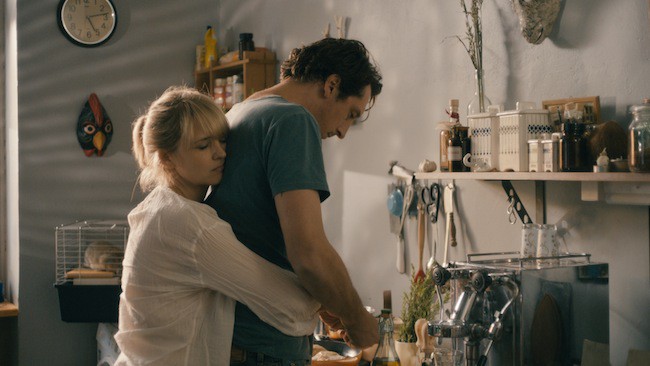Sonja Heiss studied at the HFF Film School of Munich before acquiring experience in advertising. Her first feature, Hotel Very Welcome, won the “Dialogue en perspective” prize at the Berlinale. (Cineuropa.org)
Hedi Schneider Is Stuck will be playing at the Berlin 2015 Film Festival.
W&H: Please give us your description of the film playing.
SH: A loving and happy couple faces the psychological breakdown of the (until now) funny, extroverted, and courageous wife Hedi. They try to save their love, but it gets damaged more and more, day by day as Hedi is totally “stuck” in her wrong-working head. Their love seems to break into pieces, even after Hedi feels better, until they decide to go with their son on a trip to Norway and agree to be happy together again for just one day.
W&H: What drew you to this story?
SH: I thought about relationships and love and how much a love can survive. I asked myself, If you love a person, what happens if your partner suddenly becomes someone else and everything he does is wrong, if he loses all his positive attributes? What if something happens out of the blue which destroys the balance of the relationship? These thoughts led me to the idea that the wife, Hedi, suffers a psychological crisis that knocks her out totally. It kicks her out of life and with her, her whole family.
W&H: What was the biggest challenge in making the film?
SH: Writing it. My goal was to make a film about love. And to make a film which doesn’t lose its humor. To combine both of these aspects with the point that Hedi suffers a mental disorder, an anxiety crisis, was extremely difficult. It took a long time until I got there. I even took a break from writing the script in between and wrote my first book.
W&H: What do you want people to think about when they are leaving the theatre?
SH: I want them to reflect about their own life and love. I want them to feel like they had a ride in a modern rollercoaster and feel exhausted. I would like them to feel, not to think too much in the moment they leave the theatre. And actually, I would be happy if some people had to cry.
W&H: What advice do you have for other female directors?
SH: Not to think too much about the fact that they are women in a male-dominated business. Not to become masculine, only because one could think that it makes it easier. There’s no problem shooting a movie in a skirt. To be authentic and not to stop doing this exhausting job when they have a baby. To try to fight the worries and doubts and to be more proud. To risk a lot when they make a film. Not to be always so polite and to ignore the machos or to smile to them. To keep being angry when things go wrong, even if people call you a bitch. If we were men, people would say instead that we know what we want.
W&H: What’s the biggest misconception about you and your work?
SH: Maybe in Germany, it would be that a film in which you have to laugh cannot be serious. Or that humor means that you don`t tell a profound story. I think, though, that’s a very German point of view. And, of course, not everybody thinks that way. But a lot of people still make this pretty simpl[istic] distinction: A film is either a comedy or a profound drama, a film is either entertainment or art. I think that’s starting to change, though. At least I hope it is.
W&H: Name your favorite woman-directed film and why.
SH: That’s the hardest question for me now, since most of my favorite films are directed by men. No wonder, though, as most films are directed by men. Most of the money goes into films made by men. There’s such a long history of film made almost solely by men.
But there are great female directors nowadays. I like Sofia Coppola`s films a lot: Virgin Suicides, Lost in Translation, Marie Antoinette, Somewhere. I like Miranda July’s work a lot. I like a lot the work of my colleague and friend Maren Ade. I really liked the film We Need to Talk about Kevin by Lynne Ramsay. And also The Kids are All Right by Lisa Cholodenko was a beautiful film. There’s probably so many more.






